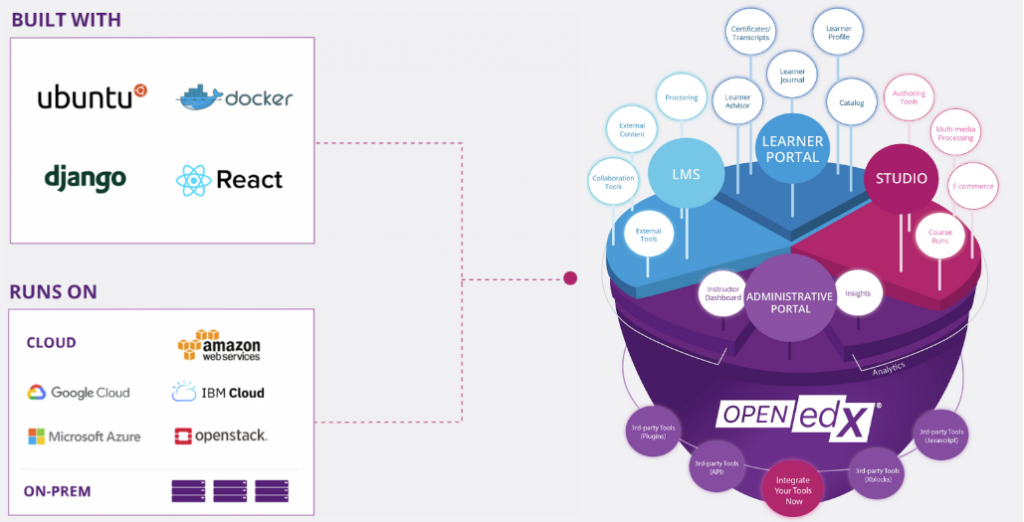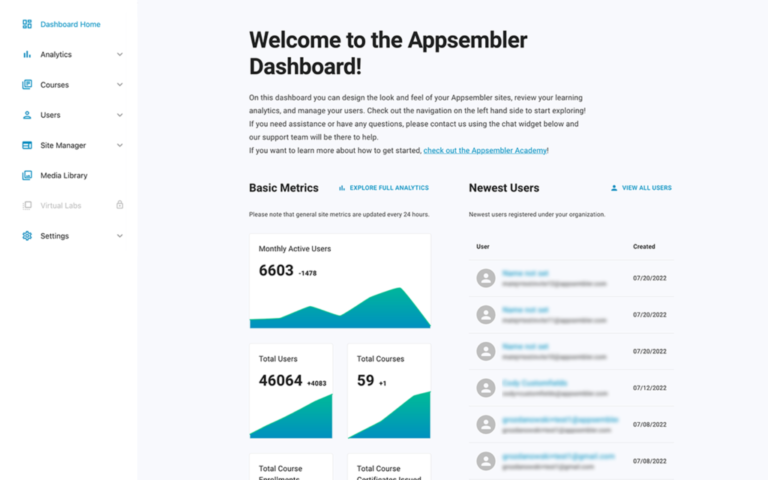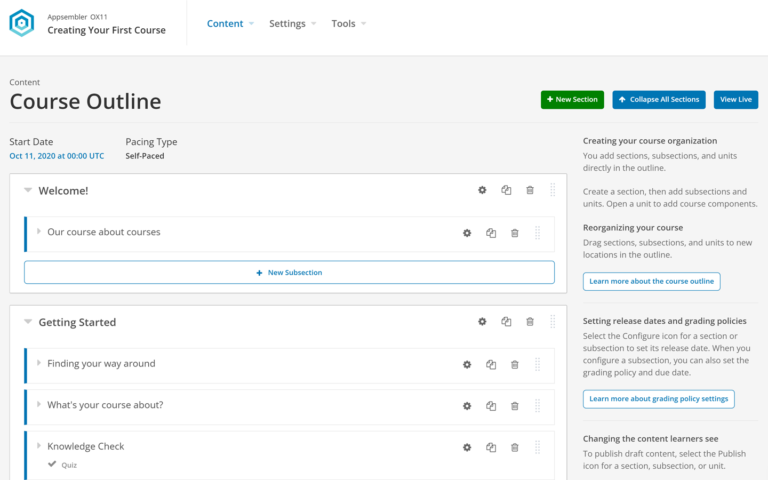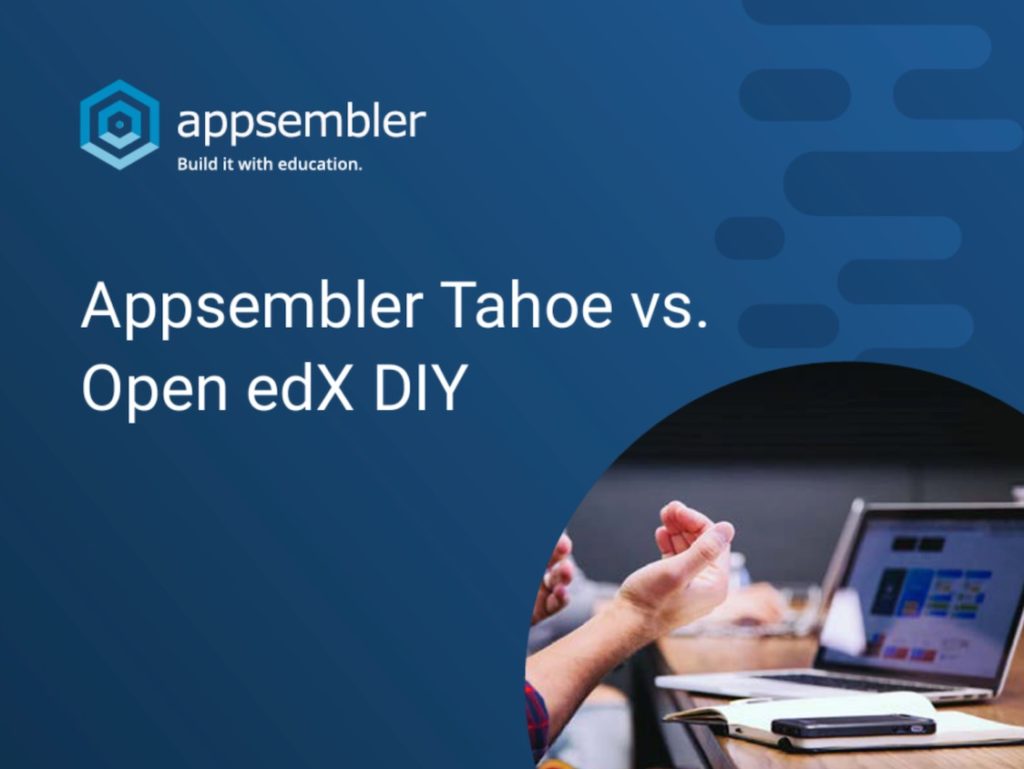Open edX is a leading open-source eLearning platform designed to facilitate global education. In this article, we delve into its core components, discuss the significance of open source in eLearning, and explore the platform’s advantages and potential challenges. As we navigate through the intricacies of Open edX, we also forecast the trends that might shape its future
Key Takeaways
- Core components of Open edX, including its Learning Management System and course authoring tools.
- The transformative role of open source in modern eLearning platforms.
- Primary benefits institutions can derive from using Open edX.
- Potential challenges and how to mitigate them.
- Emerging trends and predictions for the future of Open edX.
Table of Contents
- What is Open edX?
- Core Components of Open edX
- The Importance of Open Source in eLearning
- Advantages and Benefits of Open edX
- Key Features and Functionalities
- Challenges and Limitations of Open edX
- Who Uses Open edX?
- Appsembler: Bridging the Gaps in Open edX
- The Future of Open edX: Trends and Predictions
- Frequently Asked Questions
What is Open edX?
Open edX is a free, open-source learning platform developed to deliver online courses tailored to the needs of learners and educators alike.
Taking a brief walk down the corridors of history, Open edX was birthed by Harvard University and MIT in 2013. The primary intent was to answer the burgeoning demand for MOOCs (Massive Open Online Courses). The partnership aimed to facilitate quality education for everyone, regardless of geographic or economic constraints.
But it wasn’t just about creating another eLearning platform. The mission was clear: to foster a global community that continually innovates on the platform, ensuring an ever-evolving learning experience. The vision, even grander, aspired to reinvent education itself, making it more accessible, relevant, and effective for the modern world.

Core Components of Open edX
Diving deeper into the infrastructure of Open edX, it becomes evident that its prowess as a leading LMS doesn’t just hinge on its philosophy, but also its intricate architecture.
Open edX LMS
The Open edX Learning Management System (LMS) serves as the central hub for delivering online courses and managing the learning experience. It offers a user-friendly interface for both instructors and students, making it easier to navigate through course content, participate in discussions, submit assignments, and track progress.

Studio (Course Authoring Tool)
Studio is the content authoring and course management tool that complements the LMS. It empowers instructors and course creators with a user-friendly, web-based interface to design, develop, and manage online courses effectively. With Studio, educators can easily create and organize course content, including videos, text, assessments, and interactive elements.
Studio is an essential tool for educators and institutions using the Open edX platform to deliver high-quality, customizable online courses. It empowers course creators to design engaging learning experiences and provides the flexibility to continually refine and improve their online courses based on learner feedback and performance data.

XBlocks (Modular Course Components)
XBlocks are a key component of the Open edX platform, designed to enhance the flexibility and customization of online learning experiences. These modular content units allow educators to seamlessly integrate a wide range of interactive elements, such as quizzes, videos, simulations, and more, into their course materials. XBlocks provides a versatile framework for developers and instructional designers, enabling them to create and share custom learning tools and content, making Open edX an adaptable and powerful platform for online education. Whether you want to add gamification elements, specialized assessments, or unique content types, XBlocks empowers educators to tailor their courses to meet specific learning objectives and engage students effectively.
Insights (Analytics Engine)
Insights is the robust analytics engine at the heart of Open edX, offering educators and administrators valuable insights into learner engagement and course effectiveness. This powerful tool allows you to track and analyze various aspects of your online courses, including student progress, assessment performance, and engagement patterns. Insights provides data-driven metrics and visualizations that help optimize course design and delivery, identify at-risk students, and enhance the overall learning experience. With Insights, Open edX users can make informed decisions to improve their online courses, boost learner retention, and achieve better educational outcomes. It’s an essential component for anyone looking to harness the full potential of the Open edX platform.
These components collectively form the backbone of Open edX, ensuring that it isn’t just another LMS but a holistic platform tailored to redefine the paradigms of online education.
The Importance of Open Source in eLearning
Technological advancements have profoundly influenced the educational sector, and among the standout innovations are open-source platforms. Their adoption has ushered in a new era of accessibility, customization, and collaboration.
Benefits of Open-source Platforms:
- Customizability: Institutions are not confined to a one-size-fits-all approach. Open-source platforms grant the freedom to tailor and tweak the software to cater to specific educational needs.
- Cost-Effective: Without the burden of hefty licensing fees, institutions can redirect funds to other pivotal areas, ensuring a more resource-efficient learning environment.
- Community Support: A shared global platform means a community of users, developers, and enthusiasts continually improving and supporting the tool. This collective effort results in rapid troubleshooting and the integration of innovative features.
- Transparency and Security: Every facet of open-source software is open for scrutiny, ensuring its integrity. This transparency builds trust and ensures a robust and secure platform.
How Open edX Stands Out from Other eLearning Platforms:
Open edX doesn’t just ride the wave of open-source benefits; it amplifies them. Its robust architecture, combined with a focus on interactive and immersive learning, sets it apart. The platform’s ability to integrate many third-party apps and tools means it’s not just an LMS, but a holistic educational ecosystem. Moreover, with institutions like Harvard and MIT behind its inception, Open edX is rooted in academic excellence, ensuring its continual evolution to meet the ever-changing demands of the global learning community.
While many platforms have embraced the open-source ethos, Open edX epitomizes its essence, amalgamating innovation with accessibility to redefine eLearning paradigms.
Advantages and Benefits of Open edX
Unparalleled Customization: Open edX offers an unmatched advantage in the world of online learning platforms: complete ownership over your learning experience. Unlike other platforms that may limit your customization options, Open edX empowers you to tailor your site precisely to your needs. This flexibility is why organizations are increasingly making the switch from proprietary systems to Open edX.
Embracing Open Source Innovation: Open edX thrives on innovation through collaboration. As an open-source platform, it benefits from contributions by global industry leaders like Google and Microsoft, who continually enhance its features. What’s more, Open edX is accessible without immediate expenses, making it an attractive choice for organizations seeking cost-effective solutions. By joining the Open edX community, organizations can tap into a wealth of shared knowledge, engage with brilliant engineers and developers, and stay at the forefront of educational technology.
Seamless Scalability: Open edX was purposefully designed with scalability in mind, allowing your organization to shape learning experiences that stretch beyond the ordinary. With its array of customizable features, including the versatile XBlocks, Open edX ensures that expanding and modifying your platform remains a streamlined process.
Proven Excellence: Trusted by renowned institutions such as Georgetown, Stanford, Google, and Microsoft, Open edX has established itself as a global leader in open-source online education. With 2U’s acquisition of edX, Open edX’s resources are set to expand, solidifying its position as a top-choice platform for delivering scalable and learner-centric experiences. Open edX continues to pave the way for administrators and students, ensuring a future of educational excellence.
Key Features and Functionalities
The success of an eLearning platform is often gauged by its array of features and functionalities. In this regard, Open edX is not only equipped but also at the forefront, offering a suite of capabilities that make it a powerhouse in the realm of online education. Let’s delve into some of the standout features that set Open edX apart.
Adaptive Learning and Advanced Grading Options: Personalization is a hallmark of effective education. Open edX’s adaptive learning feature ensures that content is delivered in sync with a learner’s pace and understanding. If students excel in a module, they’re challenged further; if they struggle, additional resources and support mechanisms kick in. Complementing this is the platform’s advanced grading system, which allows institutions to employ many assessment techniques, be it multiple-choice tests, peer assessments, or project-based evaluations.
Certification and Badging Capabilities: In today’s competitive world, validation of skills and achievements is paramount. Open edX recognizes this and offers robust certification and badging functionalities. Upon successful course completion, learners can earn certificates that not only validate their prowess but also boost their professional profiles. The platform’s badging system further gamifies the learning experience, offering tangible tokens of accomplishments, and fostering motivation and engagement.
Collaboration Tools and Forums: Learning isn’t a solitary endeavor; it thrives on collaboration and discourse. Open edX’s suite of collaboration tools ensures that learners are not isolated entities but are part of a vibrant community. Discussion forums facilitate peer interactions, fostering a culture of shared learning and knowledge exchange. Whether seeking clarifications, engaging in debates, or sharing resources, these collaborative spaces amplify the learning experience.
Integration Capabilities with Third-party Tools: No platform, no matter how advanced, can operate in isolation. Recognizing the interconnected nature of the digital ecosystem, Open edX is built with extensive integration capabilities. Whether CRM systems, payment gateways, or specialized educational tools, Open edX can seamlessly meld with third-party applications, ensuring a holistic and uninterrupted learning environment.
The features and functionalities of Open edX are not mere add-ons; they are integral components that underpin the platform’s commitment to delivering a comprehensive, engaging, and effective learning experience. They epitomize Open edX’s ethos of innovation, inclusivity, and interactivity.
Challenges and Limitations of Open edX
While Open edX offers a wealth of advantages, it’s crucial to assess the challenges and limitations it presents before making a commitment.
Dependence on Dedicated IT Resources: The initial appeal of Open edX as a cost-effective solution can be offset by the resource-intensive nature of its implementation. While there are no upfront purchase costs or annual fees, organizations must rely on dedicated IT teams to install, configure, integrate, and maintain the platform. For organizations with limited access to specialized IT resources, this dependency can quickly become a drain on time, budget, and personnel.
Self-Reliance for Support: While the Open edX community provides a collaborative space for sharing knowledge and innovations, it primarily focuses on the platform’s development rather than day-to-day support. Organizations using Open edX must be self-reliant when it comes to addressing platform issues, troubleshooting bugs, and ensuring site performance. The absence of professional support can be a significant drawback, especially for online universities catering to paying audiences who expect responsive assistance, reliable site performance, and premium uptime.
Alignment with Open edX Roadmap: Open edX’s roadmap and priorities may not always align with the specific needs and objectives of every organization. The platform’s innovation direction tends to cater more to the university use case, potentially leaving other sectors searching for better-aligned solutions. It’s essential for organizations to evaluate whether Open edX’s trajectory matches their own requirements.
Self-Hosting Requirements: Self-hosting an Open edX instance entails hosting costs, reliance on internal IT resources, and the need for skilled developers and engineers to maintain site reliability. Setting up and managing an instance can be complex and expensive, with hosting expenses averaging around $33,368 annually. For some organizations, this self-hosting burden may outweigh the benefits, making it a critical factor to consider when deciding on the suitability of Open edX for their training initiatives.
Who Uses Open edX?
Open edX is trusted by organizations of all sizes and industries to power their online learning initiatives. Smaller organizations leverage Open edX to improve their bottom line and deliver a positive learning experience. Large enterprises use the platform to train employees, onboard clients, and educate customers. Even renowned educational institutions like MIT and Harvard rely on Open edX to engage their students in an online setting.
The extensive Open edX wiki contains a treasure trove of information, including a comprehensive list of sites powered by Open edX and a directory of Open edX service providers. These resources highlight the expansive reach and collaborative spirit of the Open edX community.
Furthermore, Open edX is an ideal choice for software companies. It serves as a powerful tool for developer marketing and developer education. By creating courses that demonstrate the value and features of their products, software companies can drive product adoption and usage. Redis University is an excellent example of successful implementation of Open edX for developer education.

Another example, MongoDB, an open source database, could previously only train 1,800 people per year with their in-person training. However, with their Open edX site, they were able to train 14,000 during the same timeframe and MongoDB University now serves as its largest source for lead generation and an effective developer marketing initiative. Learn How MongoDB Built a World-Class Developer Marketing Machine.
Appsembler: Bridging the Gaps in Open edX
While Open edX has a large, loyal community of users who are content with its service offerings, many organizations are beginning to seek out Open edX alternatives that offer a hosted solution, more professional support, less internal upkeep, and features that cater to their learning audiences.
While Open edX offers many features, Appsembler’s Tahoe LMS refines and amplifies them. Its visual course builder simplifies content creation, making it accessible even for non-tech-savvy educators. The platform’s analytics delve deeper, offering insights not just on student performance but also on course engagement and effectiveness. Additionally, with Appsembler’s integration capabilities, third-party tools meld effortlessly with Open edX, crafting a cohesive learning ecosystem.
Several institutions have reaped the benefits of marrying Open edX with Appsembler. Companies like Snowflake, Redis, and Dremio to leading Universities, and nonprofit organizations all use Appsembler to easily create and deliver immersive courses to audiences with their own branded Open edX sites using Appsembler’s Tahoe LMS. It enables organizations to benefit from the power of Open edX while leaving the details (such as hosting, version upgrades, and ongoing maintenance) to a team of dedicated Open edX experts.
Take the Next Step with Appsembler
If you’re unsure which option is best for your organization or want to explore how Appsembler can meet your specific needs, reach out to Appsembler today. Experts will guide you through the decision-making process and help you determine the right solution for your online university.
The Future of Open edX: Trends and Predictions
Open edX, since its inception, has been a torchbearer in the eLearning domain, continually evolving to meet the changing needs of learners and educators. As we gaze into the future, it’s clear that this platform has an ambitious roadmap ahead, aiming to not only adapt to but also shape the trajectory of online education.
Upcoming Updates and Feature Additions: Open edX’s commitment to innovation is unwavering. On the horizon are several promising updates. Anticipated are even more sophisticated adaptive learning algorithms that cater to the granular nuances of individual learning patterns. There’s also buzz around enhanced AR (Augmented Reality) and VR (Virtual Reality) integrations, aiming to offer immersive learning experiences. Furthermore, in the pipeline are tools focusing on peer learning, emphasizing the community aspect of education, and facilitating organic, student-driven discussions and collaborations.
The Role of Open edX in the Evolving World of Online Education: The landscape of online education is undergoing a seismic shift. With the lines between traditional and online learning blurring, platforms like Open edX are poised to play a pivotal role. As institutions increasingly look for hybrid learning models, Open edX, with its flexibility and integrative capabilities, will be at the forefront, bridging the physical and digital realms of education. Moreover, as lifelong learning becomes the norm, Open edX is expected to expand its purview beyond traditional academic courses, catering to a diverse range of learners seeking continuous skill enhancement.
The future of Open edX is not just about technological advancements or feature additions. It’s about a vision – a vision to democratize education and make it accessible, engaging, and relevant. As trends unfold and predictions turn into realities, Open edX stands ready to usher in a new era of learning that resonates with the needs of the contemporary learner and the aspirations of the future.
Frequently Asked Questions
Open edX offers several advantages over proprietary learning systems. It provides full ownership and customization capabilities, allowing organizations to tailor their online learning platform to their specific needs. Additionally, Open edX benefits from a vibrant open-source community, which results in continuous improvements and new features. In contrast, proprietary systems may have limitations in terms of customization and may require costly licensing fees.
Absolutely! Open edX is trusted by organizations of all sizes, including large enterprises. Its scalability and versatility make it an excellent choice for training employees, onboarding clients, and educating customers. With features like self-paced training, learner analytics, and cohort-specific content, Open edX empowers large enterprises to deliver impactful learning experiences at scale.
Absolutely! One of Open edX’s strengths is its integration capabilities. It’s designed to meld with various third-party tools seamlessly, be it CRMs, payment gateways, or specialized educational tools, ensuring a holistic learning environment.
While Open edX itself is free to use due to its open-source nature, potential costs can arise based on how you choose to implement and maintain it. This can include costs for hosting, customization, third-party integrations, or even specialized support.
The open-source model of Open edX provides multiple advantages. Users benefit from a continuous influx of updates and features from the global community. It also provides a high degree of transparency, ensuring educators and learners know exactly what they’re working with. Plus, the customization potential means institutions can tailor the platform to their unique requirements.
Open edX differentiates itself primarily through its open-source nature, allowing unparalleled customization and scalability. Its rich feature set, combined with an active community, positions it as a versatile platform suitable for various educational needs, from large universities to individual educators.
